The Pegan Diet is a unique blend of Paleo and vegan principles that prioritizes whole, nutrient-dense foods. You'll focus on fresh fruits, vegetables, nuts, seeds, and high-quality proteins while limiting grains, dairy, and refined sugars. This approach not only supports weight loss and boosts energy levels, but it also enhances gut health and longevity. You'll enjoy a variety of foods like legumes for protein and avocados for healthy fats, while avoiding processed items and sugar-laden snacks. Embracing the Pegan Diet can lead to various health benefits, and there's more to discover about meal planning and sustainable practices.
Key Takeaways
- The Pegan Diet combines the principles of Paleo and vegan diets, focusing on whole, nutrient-dense foods.
- It promotes a plant-based foundation while allowing sustainably sourced meats and dairy in moderation.
- Key foods include fruits, vegetables, nuts, seeds, and high-quality plant-based proteins, while avoiding refined sugars and gluten-containing grains.
- The diet supports weight loss, boosts energy, and improves overall health through balanced nutrition and fiber-rich foods.
- Emphasizing sustainability, the Pegan Diet encourages local, seasonal, and organic food choices to reduce environmental impact.
What Is the Pegan Diet?
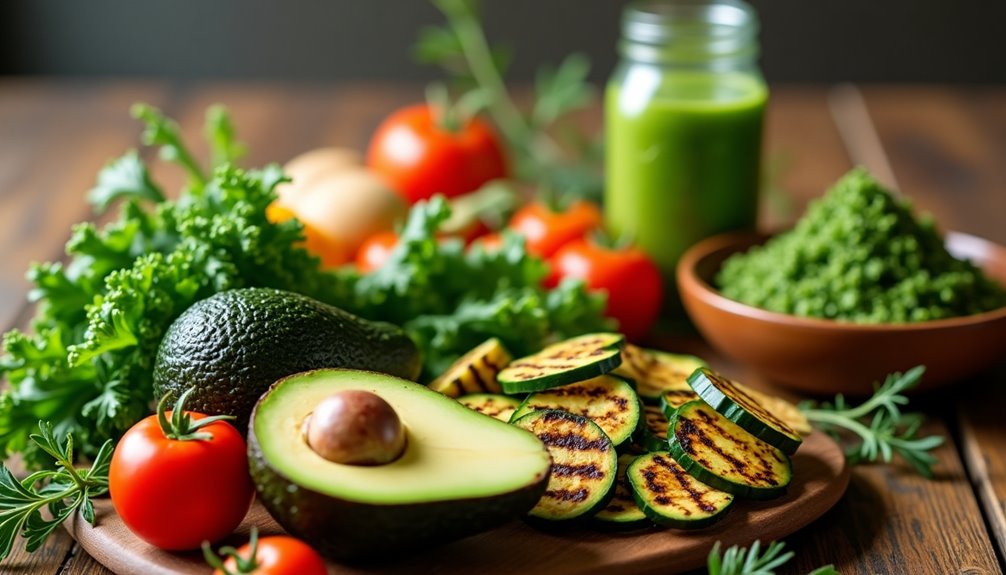
The Pegan diet blends principles from both the Paleo and vegan diets, aiming to create a balanced approach to eating that supports health and sustainability. At its core, the Pegan diet philosophy encourages you to prioritize whole, nutrient-dense foods while minimizing processed options. This means focusing on fresh fruits, vegetables, nuts, seeds, and high-quality proteins, which can help you achieve nutrition balance.
When you adopt the Pegan diet, you'll encounter specific Pegan diet restrictions. For instance, you'll want to limit grains and dairy, as well as avoid refined sugars and unhealthy fats. These restrictions push you to make mindful food choices that nurture your body and align with ethical considerations.
While you might miss some conventional favorites, you'll discover a world of delicious alternatives that can satisfy your cravings and enhance your well-being. Additionally, the Pegan diet is known to offer significant health benefits, such as lower cholesterol levels and enhanced heart health.
As you explore this eating style, you'll likely find that the Pegan diet fosters a sense of community and connection. Many people are drawn to it not just for its health benefits, but also for its emphasis on sustainability and ethical sourcing.
By choosing foods that are environmentally friendly, you contribute to a larger movement toward responsible eating.
Ultimately, the Pegan diet invites you to engage with your food in a meaningful way, encouraging you to enjoy a variety of flavors while nourishing your body and respecting the planet. You'll not only feel good about what you eat but also about the impact your choices have on the world around you.
Key Principles of the Pegan Diet
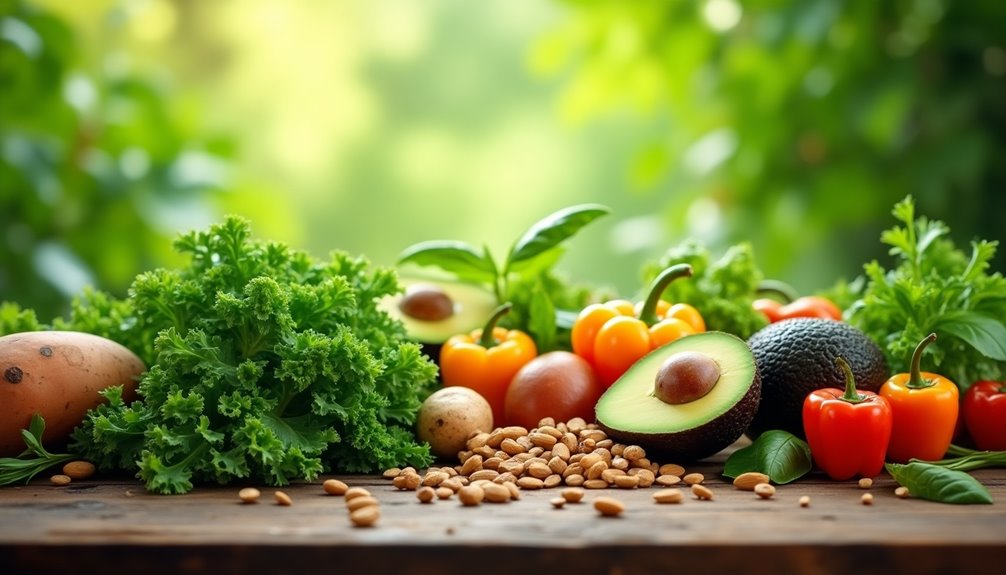
When diving into the Pegan diet, you'll find it revolves around several key principles designed to enhance your health and well-being. At its core, the Pegan diet philosophy emphasizes whole, unprocessed foods. By focusing on fresh fruits, vegetables, nuts, seeds, and high-quality proteins, you're not just eating; you're nourishing your body with essential nutrients.
One of the most significant tenets is to prioritize plant-based foods. These foods are rich in fiber, vitamins, and minerals, which can support digestion and overall health.
However, the Pegan diet doesn't exclude animal products entirely. Instead, it encourages you to choose sustainably sourced meats and dairy, ensuring you get protein and healthy fats while remaining mindful of your environmental impact.
Another key principle involves reducing sugar and refined carbohydrates. The goal here is to minimize inflammation and promote stable blood sugar levels, making you feel more energized and focused.
You'll also want to limit processed foods and trans fats, which can detract from your health goals.
Lastly, staying hydrated is essential. Drinking plenty of water supports digestion and helps your body absorb those essential nutrients more effectively. By following these principles, you can create a balanced, nutritious eating pattern that aligns with the Pegan diet philosophy.
This approach fosters a sense of belonging to a community that values health, sustainability, and wellness, making your journey not just a diet, but a lifestyle choice. Additionally, embracing natural calorie cycles can lead to improved well-being and vitality, aligning with the Pegan diet's emphasis on holistic health.
Health Benefits of Going Pegan
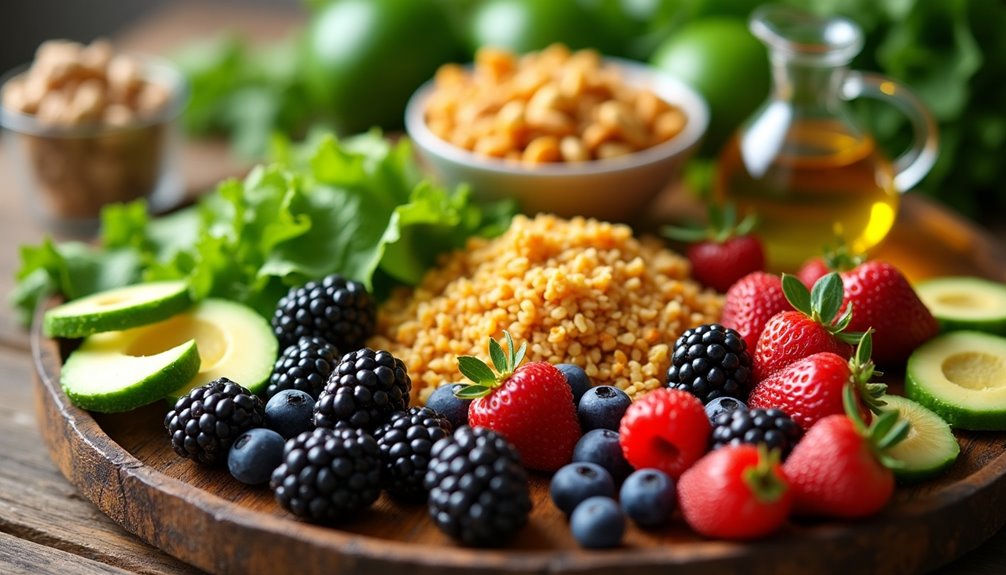
Adopting the Pegan diet can lead to a range of health benefits that enhance your overall well-being. This unique blend of paleo and vegan principles offers a balanced approach to nutrition, supporting your body in various ways. One of the most notable advantages is weight loss. Since the Pegan diet emphasizes whole, nutrient-dense foods while minimizing processed options, you're likely to consume fewer empty calories. This shift not only helps shed extra pounds but also contributes to disease prevention, as a healthier weight can reduce the risk of chronic illnesses like diabetes and heart disease.
You may also experience increased energy levels. By fueling your body with fresh vegetables, fruits, nuts, and seeds, you provide it with the essential nutrients it craves. This can lead to more sustained energy throughout the day, helping you feel more active and engaged in your daily activities.
Moreover, improved digestion is another key benefit of going Pegan. Foods rich in fiber, like leafy greens and legumes, support gut health and promote regular bowel movements. A healthy digestive system can enhance nutrient absorption, further supporting your overall health. Additionally, adopting a Pegan diet aligns with the principles of plant-based diets, which are shown to promote longevity and lead to a longer, healthier life.
In joining the Pegan community, you're not just embracing a diet; you're making a commitment to a lifestyle that prioritizes your health and well-being. The combination of weight loss, disease prevention, increased energy, and improved digestion makes the Pegan diet a compelling choice for anyone looking to adopt a healthier way of living.
Foods to Include in Your Diet
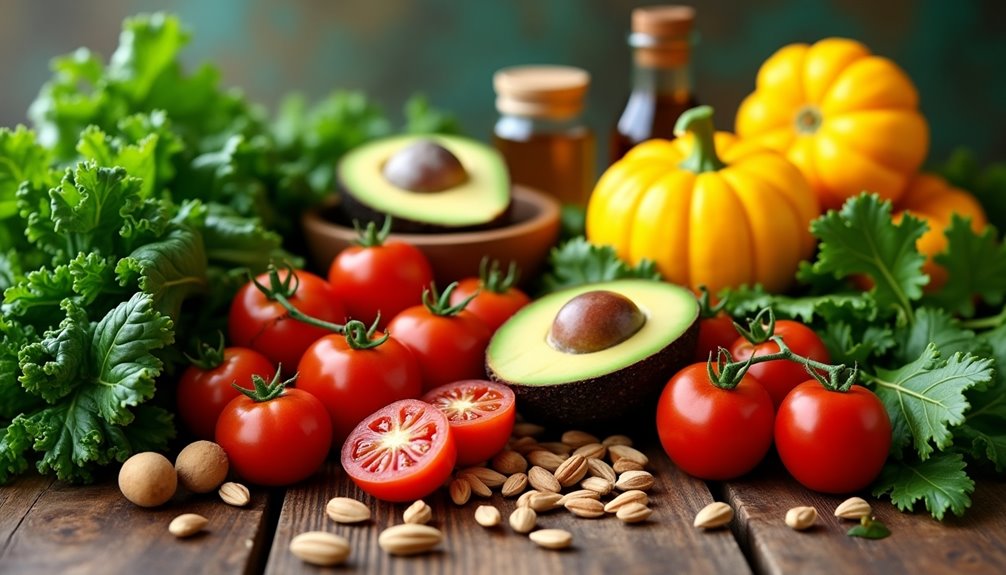
Incorporating a variety of nutrient-dense foods into your Pegan diet is essential for maximizing its health benefits. This hybrid approach emphasizes whole, unprocessed foods that nourish your body while promoting a balanced lifestyle. To create meals that are both satisfying and nutritious, focus on including high-quality plant-based proteins and healthy fats.
Here are some key foods to include in your Pegan diet:
- Legumes and beans: Great sources of plant-based proteins, they provide fiber and essential nutrients, helping you feel full and energized.
- Avocados and nuts: Packed with healthy fats, they support heart health and provide a creamy, satisfying texture to your meals.
- Leafy greens and cruciferous vegetables: Rich in vitamins, minerals, and antioxidants, these veggies are essential for maintaining overall health and can be easily added to salads, smoothies, or stir-fries. Additionally, incorporating whole food sources of protein can enhance your energy levels and support muscle building.
Foods to Avoid on the Pegan Diet
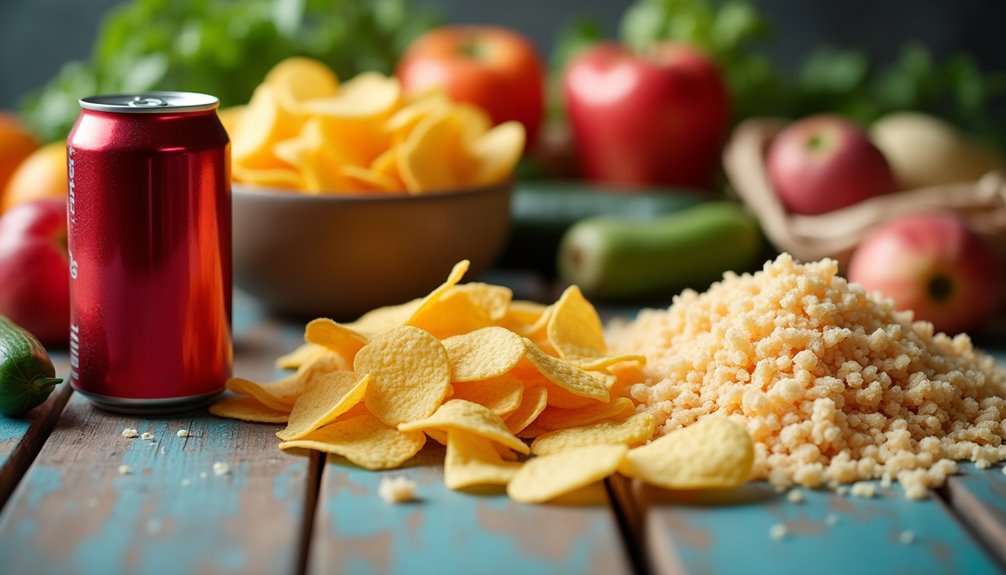
While focusing on nutrient-dense foods is important, being mindful of what to avoid is equally critical for adhering to the Pegan diet. This hybrid approach merges the principles of Paleo and veganism, emphasizing whole, unprocessed foods. Start by cutting out refined sugars and processed foods, which can hinder your health goals. Opting for fresh, seasonal produce instead will help you stay aligned with Pegan principles.
Next, you'll want to avoid dairy products. Instead of traditional dairy, consider using substitutes for dairy like almond milk, coconut yogurt, or cashew cheese. These options provide creaminess without the inflammatory effects of cow's milk.
When it comes to grains, steer clear of gluten-containing options like wheat, barley, and rye. Instead, focus on alternatives to gluten such as quinoa, buckwheat, and amaranth. These grains aren't only gluten-free but also packed with nutrients, making them excellent additions to your meals. In fact, avoiding traditional bread can prevent blood sugar spikes that lead to cravings.
Additionally, be cautious with legumes and beans, as they can be harder to digest for some people. While they can fit into a Pegan diet in moderation, it's best to prioritize other protein sources like nuts and seeds.
Meal Planning and Preparation Tips

How can you effectively plan and prepare meals on the Pegan diet? Meal planning and preparation are crucial for staying committed to this nutritious lifestyle. Start by dedicating some time each week to brainstorm and create a menu. This not only saves you time but also helps you avoid those last-minute unhealthy choices.
Here are a few tips to get you started:
- Embrace batch cooking: Prepare larger portions of meals, like vegetable soups or stews, and store them in the fridge or freezer. This guarantees you always have healthy options on hand.
- Experiment with flavor combinations: Don't be afraid to mix herbs, spices, and different veggies to create dishes that excite your taste buds. For instance, try a fusion of roasted sweet potatoes with cumin and cilantro for a delightful side.
- Focus on seasonal produce: Not only is it fresher, but seasonal fruits and vegetables often taste better and are more affordable. Additionally, consider following easy-to-follow recipes to simplify your cooking process and ensure variety in your meals.
Common Misconceptions About Pegan
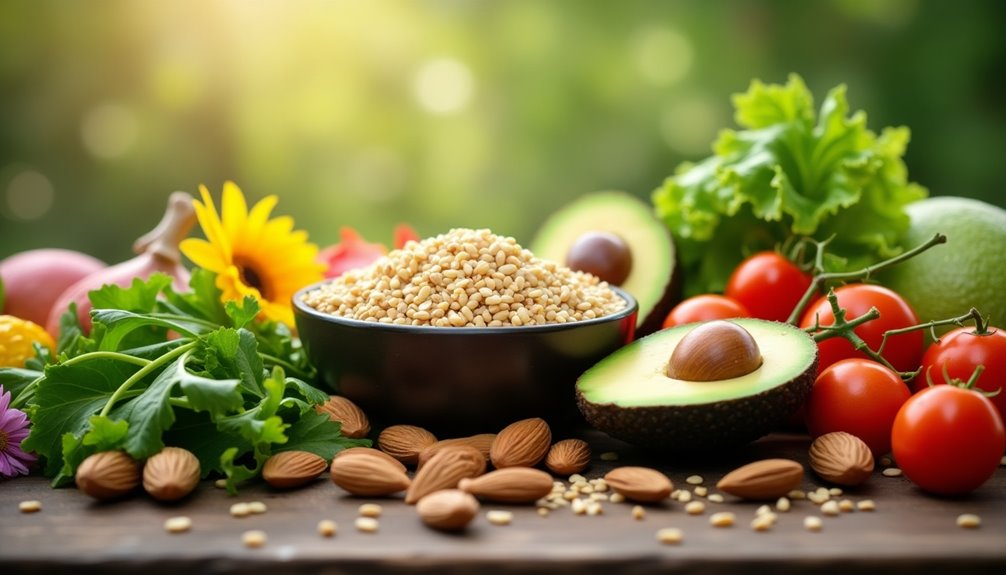
The Pegan diet often faces a range of misconceptions that can deter people from fully understanding its benefits. One common myth is that it's overly restrictive, leaving you feeling deprived. In reality, this hybrid diet emphasizes nutrition balance, allowing a variety of foods, including fruits, vegetables, nuts, seeds, and high-quality proteins. You can actually enjoy a diverse array of meals while nourishing your body.
Another misconception is that the Pegan diet is solely for those who identify with either the Paleo or vegan lifestyles. This isn't true. The Pegan approach is more about combining the best aspects of both diets, focusing on whole foods and minimizing processed options. This inclusivity can foster a sense of community among individuals who are looking to improve their health while being mindful of their choices.
Sustainability concerns are often raised, with some believing that a Pegan diet isn't environmentally friendly. However, by prioritizing plant-based foods and responsibly sourced animal products, you can make a significant positive impact. This diet encourages seasonal, local, and organic options, aligning with sustainable practices. Additionally, incorporating fresh, whole fruits can enhance your overall health and energy levels, similar to the benefits seen in The Smoothie Diet program.
Lastly, many think the Pegan diet is complicated or difficult to maintain. With a little education and planning, it can actually be quite manageable. Embracing the Pegan lifestyle means making informed choices that support both your health and the planet, fostering a sense of belonging among those who share similar values. By dispelling these misconceptions, you can fully embrace the Pegan diet and its potential for a healthier, more sustainable life.
Getting Started With the Pegan Diet
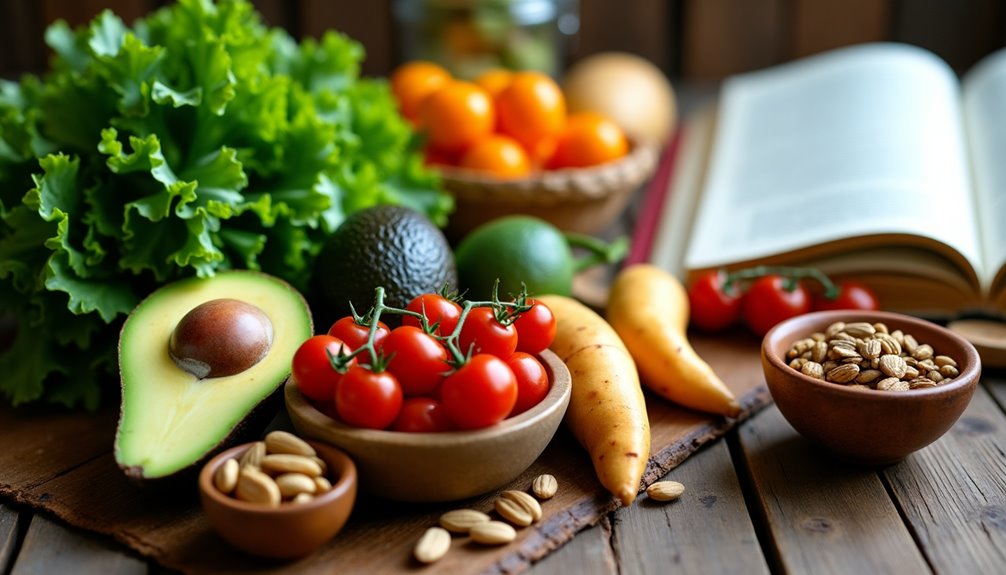
Getting started with the Pegan diet is simpler than you might think. By blending the best aspects of the Paleo and Vegan diets, you can create a balanced and nutritious eating plan that supports your health goals. Here are some practical steps to help you begin your journey:
- Focus on Whole Foods: Prioritize fruits, vegetables, nuts, seeds, and high-quality proteins.
- Plan Your Meals: Think ahead about meal ideas that incorporate a variety of Pegan-friendly ingredients.
- Shop Smart: Make grocery shopping easier by sticking to the perimeter of the store, where fresh produce and whole foods are typically located.
When planning your meals, aim for a colorful plate filled with plenty of veggies and healthy fats. For instance, a hearty vegetable stir-fry with avocado, or an invigorating salad topped with nuts and seeds, can be both satisfying and nourishing. Aim to include lean proteins like grass-fed meats or plant-based options like legumes and tofu to keep your meals balanced.
Additionally, consider incorporating deep breathing exercises into your routine, as they can significantly enhance your metabolism and calorie burning while following the Pegan diet.
Before you head to the grocery store, create a shopping list of Pegan staples. This won't only make your trip efficient but also help you avoid impulse buys that don't align with your goals.
Frequently Asked Questions
Can I Eat Grains on the Pegan Diet?
When you're considering eating grains, there's a lot of debate about their nutritional benefits. While some grains can be healthy, it's often recommended to focus on grain alternatives like quinoa, millet, or cauliflower rice. These options offer great Pegan meal ideas that fit your dietary needs. Incorporating these alternatives can help you enjoy meals while reaping the benefits of a balanced approach, so you can feel good about what you eat!
Is the Pegan Diet Suitable for Athletes?
The Pegan diet can be appropriate for athletes, but you need to be mindful of potential nutrient deficiencies. It emphasizes whole foods, which can enhance performance benefits by providing essential nutrients. However, if you're not careful, you might miss out on crucial carbohydrates and proteins that support intense training. Balancing your meals with the right macronutrients will help you maintain energy levels and optimize your athletic performance while adhering to this dietary approach.
How Does the Pegan Diet Impact Mental Health?
The foods you eat can greatly impact your mental health. A diet rich in whole foods supports stress management and mindfulness, helping you maintain emotional balance.
Research shows a strong gut-brain connection, meaning what you consume can affect mood fluctuations. By prioritizing nutrient-dense options, you can enhance your overall well-being, potentially reducing anxiety and depression.
Embracing this approach fosters a sense of belonging to a community that values holistic health and mental clarity.
Are There Any Supplements Needed on the Pegan Diet?
Picture your body as a garden; to flourish, it needs essential nutrients. While a balanced diet can cover most bases, you might find supplements helpful, especially for vitamins B12 and D, omega-3 fatty acids, and iron.
Since plant-based sources alone mightn't always meet these needs, consider adding high-quality supplements to your routine. This way, you nurture your health and guarantee your garden blooms beautifully, fostering a sense of belonging within your wellness community.
Can I Follow the Pegan Diet While Pregnant?
You can follow a plant-based diet during pregnancy, but you need to pay close attention to your nutrient requirements. Focus on getting enough protein, iron, calcium, and omega-3 fatty acids, as pregnancy concerns can arise from deficiencies. It's wise to consult a healthcare professional or a registered dietitian to guarantee you meet all your nutritional needs. Balancing these elements can help support both your health and your baby's development effectively.
Conclusion
Embracing the Pegan diet can feel like finding the perfect balance on a seesaw—it requires attention and practice. Research shows that diets rich in whole foods can reduce chronic disease risk by up to 30%. By weaving together the best of paleo and vegan principles, you're not just nourishing your body; you're creating a sustainable lifestyle. So, take that first step onto the seesaw; with time, you'll find stability and wellness in your daily choices.



